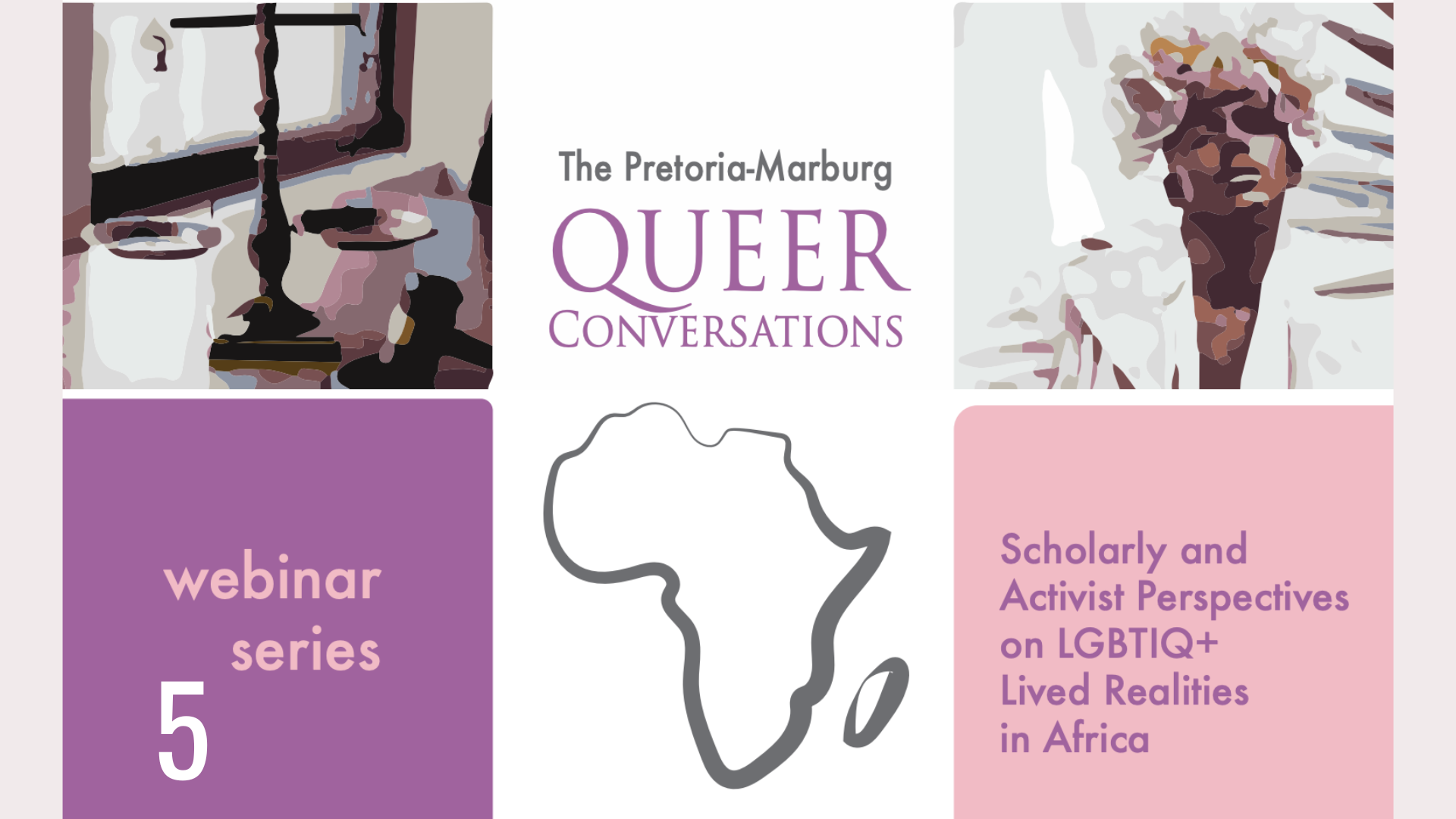On 9 June 2022 the Centre for Human Rights (CHR) at the University of Pretoria facilitated the fifth event in the Pretoria-Marburg Queer Conversations: Scholarly and Activist Perspectives on LGBTIQ+ Lived Realities in Africa in collaboration with the Centre for Sexualities, AIDS, and Gender (CSA&G) at the University Pretoria, the Center for Gender Studies and Feminist Futures (CGS) and the Center for Conflict Studies (CCS) at the University of Marburg. The Pretoria-Marburg Queer Conversations series creates a monthly space for in-depth discussions designed to tap into the intersections of knowledge-production and transfer between diverse scholarly and activist spheres and contributes to methodological, conceptual, and normative aspects of centering LGBTIQ+ rights and lived realities in African contexts.
The Pretoria-Marburg Queer Conversations continue on 8 September 2022 with the topic ‘Prospects and Challenges for Transnational Activism to Advance LGBTIQ+ Rights in Africa’ organised by the Center for Gender Studies and Feminist Futures (CGS) and the Centre for Conflict Studies (CCS) at the University of Marburg. Register for the following webinar below:
- 8 September 2022, 12:00 SAST to 13:30 SAST / 12:00 CET to 13:30 CET:
Dr Ayodele Sogunro from the CHR moderated the discussion of the fifth webinar event titled ‘Queering Perspectives on Power Dynamics: Advocacy and the Intersections of Class, Gender, and Race in the Realisation of LGBTIQ+ Rights in Africa’. The first panelist Prof Charles Ngwena is a Professor of Law at the Centre for Human Rights of the University of Pretoria who has widely published on issues at the intersection between human rights and health including HIV/AIDS and reproductive and sexual health in African regions. Furthermore, Prof. Ngwena works in the fields of disability rights, race culture and sexualities. The second panelist Dr Rudo Chigudu is an African feminist, activist-scholar and artist fiercely committed to social justice and community self-determination. She has worked at both local and international levels combining feminism, decoloniality and the creative arts to advance dialogue, expression and radical transformation.
During the first part of the discussion, Dr Chigudu provided a general overview of her research background, objectives and research questions. She also explored the gendered and sexualised politics of a lesbian identity focusing on the Zimbabwean context. In recent writings by scholars, activists, and bloggers, African lesbian women have been portrayed as passive victims who were trapped in the history of political homophobia and the abusive hegemony of Western ethnocentric discourse. Curios about how African women come to be a self-identifying lesbian, Dr Chigudu continued by addressing one of her research questions on lesbian identity among African women in Zimbabwe. The process of identification is motivated by three driving forces. First is the idea of oppression by states or institutions, which creates the need to identify with others who share similar experiences. Second, identity as subversion as a result of the imposition of how women’s sexuality is framed by others. Third, the performance of lesbian identities emerging in intimate relationships resembling heterosexual relationships in which one is presented as masculine and the other as feminine.
Prof. Ngwena continued the discussion with the question "What is Africanness?". He pointed out that it is critical to consider the origins of race, which is a political and social construction developed by Europeans in the 15th and 16th centuries to produce and reproduce societal dominance. The LGBTIQ+ category is a manifestation of how race can shape every part of our lives. Race reveals how communities are historically constituted, and that social groups share a common history that may not be based solely on shared inherent characteristics but also on experiences of exclusion and exclusionary practices. In addition, Prof. Ngwena emphasises the importance of accounting for intersectionality, given that not all individuals experience power relations between groups equally. A fundamental aspect of intersectionality is that individuals and social groups are composed of more than one subjectivity, resulting in some groups experiencing multiple levels of subordinate power at once.
Lesbian identities continue to exist in ways that challenge compulsory heterosexuality and the narrative of same-sex sexualities as un-African. Dr Chigudu stressed the importance of unpacking the socialised gender binaries that continue to be reinforced in harmful ways even within movements in order to advance work for the rights of LGBTIQ+ individuals. Prof. Ngwena then discussed an approach to inclusive Africanness which could be understood as subjective belonging to Africa rather than as racial biology. Such an approach could ensure that Africanness is not exclusionary.
- 8 September 2022, 12:00 SAST to 13:30 SAST / 12:00 CET to 13:30 CET:
For more information, contact:
Dr Ayodele Sogunro
Centre for Human Rights
University of Pretoria
ayodele.sogunro@up.ac.za
Dr Justice Medzani
Centre for Sexualities, Aids, and Gender
University of Pretoria
justice.medzani@up.ac.za
Dr Mariel Reiss
Center for Conflict Studies
Philipps-University of Marburg
mariel.reiss@uni-marburg.de


